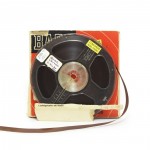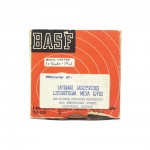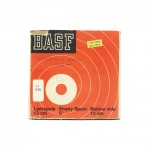Howard Fink
00:00:00.00
...Irving Layton to this stage again tonight, this time to read his poetry. The last time he was up here was to introduce Robert Creeley, and what was said then clearly explained the close relations between Mr. Layton and the Black Mountain Group in the 50's, so I won't go into that again, but I'll only add that Mr. Layton was a member of the editorial board of Black Mountain Review from 1955 on. Of course he's been publishing poetry since the 40's and was associated during those years with the First Statement Press, which became the Northern Review in 1949, and all this time studying at McGill University where he received the MA in Political Science and Economics in 1946. It's impossible to list all of his appearances in periodicals and little magazines, and I'll mention only a few of his two dozen or so volumes of poetry, anyway that's what it seemed like to me when I looked at that page in the new one. A red carpet for the sun in 1959, with the well-known introduction by William Carlos Williams which acknowledged, American recognition of Mr. Layton's reputation. A red carpet, like all of Mr. Layton's subsequent books was published by McClelland and Stewart. Then, a book of short stories and poems, The swinging flesh, which came out in 1961, Balls for a one-armed juggler in 1963, the Laughing rooster in 1964, Collected poems in 1965 and his latest work, just published this winter, Periods of the moon. And I should say the ones that I have mentioned are the ones which are still in stock and able to be bought. Among Mr. Layton's other frenetic activities, poetry readings in Canada, United States, Germany and elsewhere, television appearances, controversial ones and so on, he finds time to communicate with students as well as Poet in Residence of this University. I'd like to present Mr. Irving Layton.
Irving Layton
00:02:30.43
Thank you Howard, for your kind introduction. I'm glad that you did not introduce me as a letter writer. I'm very glad to see so large a turn out this evening, I am very heartened by it, very moved, and I'm very glad to see so many of my friends and former students in the audience. I like beginning my reading with a poem "There are No Signs" because if any one poem expresses what I try to say, and all the poems and stories that I have written, is that modern man, pretty well, has to find out where he is going, by just going. Now the old sign posts are down, and that he must make his sign posts as he goes along.
Annotation
00:04:00.19
Reads "There Are No Signs".
Irving Layton
00:04:51.82
"The Swimmer": my symbol for the poet, condemned to live in two realms, and happy to live in neither of them. The realm of actuality and the realm of the imagination. Here I compare the poet to the swimmer.
Annotation
00:05:15.02
Reads "The Swimmer".
Irving Layton
00:06:38.63
Several years ago I taught at the Jewish Library, one of my students was a Mrs. Fornheim, who had lived in Vienna, and left Vienna when that city fell to the Nazis. She went to Paris, and left Paris for Spain, when the Vichy government was formed. From Spain, she went to Portugal and then came to Montreal, where I taught her English. She died of cancer, this is my poem for her. "Mrs. Fornheim, Refugee".
Annotation
00:07:19.41
Reads "Mrs. Fornheim, Refugee".
Irving Layton
00:08:12.64
"Gothic Landscape", or what it means to be a Jewish boy growing up in a hostile neighbor of French Canadians and Italians who are convinced that you have lately murdered Christ. And where you are entranced by the Church bells every Sunday, because of the ecstatic music over the sky, over the rooftops, and yet, in that ecstatic music of the bells, a sound of menace, something alien and frightening.
Annotation
00:09:00.92
Reads "Gothic Landscape".
Irving Layton
00:10:19.46
"The Black Huntsman". This was written at a time when Jewish skin was made into lampshades. Or, the song of innocence becoming the song of experience.
Annotation
00:10:42.03
Reads "The Black Huntsman".
Irving Layton
00:12:08.26
[CUT] This is how the fringes of a prayer shawl, a sheitel is a wig. If you are an Orthodox, Jewess as my mother was, you have to cut your hair very short and wear a wig so that you are no longer attractive so to speak, to any other man but your husband. Peculiar way of looking at it.
Annotation
00:12:43.60
Reads "Archetypes".
Annotation
00:13:38.07
Reads "Soleil de Nos".
Irving Layton
00:14:15.59
"De Bullion Street". I don't suppose De Bullion Street has the reputation that it had when I was a boy. I suppose the present administration has cleaned up things, anyway harlots now are more paraparetic. So this, in a sense, is an old fashioned poem.
Annotation
00:14:40.64
Reads "De Bullion Street".
Irving Layton
00:16:10.63
"On My Way To School" or the changes that come. I wasn't the most punctual of students, and it's a great comfort to me therefore when I was late to find a sign on a Baptist Church "Jesus Saves". Many years, I returned and found some change had taken place and this poem celebrates the change, or records it.
Annotation
00:16:44.77
Reads "On My Way To School".
Annotation
00:17:20.09
Reads "Love the Conqueror Worm".
Irving Layton
00:18:31.02
"Vexata Quaestio", Western man is the product we are told, of two traditions, the Greek, and the Hebrew. The Greek, pagan, believing that all experience is worth having, and man should refuse no experience. The Hebrew believing that the proper life, salvation is to be found in obedience to God's will. The two traditions are quite contradictory and can never be reconciled. It is our unfortunate destiny to try to reconcile them, I do not think we have been successful at it because the task cannot be done, it's impossible. So I've written this poem, "Vexata Quaestio" and what I'm saying is that each and every one of us in the West is a sort of compromise between these two traditions. Here I use the tree, a tall tray, as a symbol for the Hebraic, the Macabean and the sun becomes a symbol for the pagan, and you'll see what happens to both the tree and the sun.
Annotation
00:20:11.30
Reads "Vexata Quaestio".
Irving Layton
00:21:19.44
"Cemetery in August" only humans of course are aware of death, and even in August, when you feel the flush and thrill and intensity of life, you are aware of the autumn and the winter and when you are in a cemetery, the macabre juxtaposition of life and death becomes even more intense. So I wrote this poem, "Cemetery in August".
Annotation
00:21:54.98
Reads "Cemetery in August".
Irving Layton
00:24:20.98
"To the Girls of my Graduating Class". This was a graduating class, not at Sir George Williams, but my high school I taught several years ago. And I was very fortunate one year in having six very, very lovely, nubile adolescents, very attractive, and very, very well aware of precisely where attractions lay. And very often when I was in the middle of a serious lecture in History, one of them would make some provocative gesture that would drive my thoughts from the lecture to something far more interesting.
Annotation
00:25:15.42
Reads "To the Girls of My Graduating Class".
Irving Layton
00:26:33.87
And what you see when you are in the Tavern, the kind of dreams you have about pleasure and about the strange, the strange dance that all of us lead. And this very queer life and journey of ours. And I call this "Bacchanal", and it's a rather unusual Bacchanal, because it's a rather sad one, or shall I say a prayerful one.
Annotation
00:27:10.79
Reads "Bacchanal".
Irving Layton
00:28:18.16
This one is for my son, "Maxie".
Annotation
00:28:24.04
Reads "Maxie".
Irving Layton
00:30:03.28
And I suppose all teachers of literature have had the experience of giving an aspired lecture on Shakespeare or John Dunn, and finding some hand at the back waving furiously as you're getting to the home stretch and your peroration is the most resounding thing that you've ever thought about but this hand out there, very insistent, you know, and finally you stop in the middle of the peroration and you say "Yes, yes what is it?" and the student says, "Sir, will this be on the exam?". [laughter.]
Annotation
00:30:57.82
Reads "Seven O'Clock Lecture".
Irving Layton
00:34:07.62
"The Birth of Tragedy". The title is taken from one of the earliest books of Nietsche, the Gods here that I speak about in the poem, are the Gods of Dream and Dance, of Reason and Ecstasy, Apollo and Dionysus, Nietsche held that Tragedy came from the union of both dream and dance, intellect and impulse.
Annotation
00:34:44.53
Reads "The Birth of Tragedy".
Irving Layton
00:36:44.19
And I suppose no Layton reading would be quite complete without this poem, "Misunderstanding".
Annotation
00:36:54.39
Reads "Misunderstanding".
Irving Layton
00:37:16.43
"A Cold Green Element". This is about life, death, nature, and poetry. It's really a meditation, and I hope a passionate meditation, on art and life. Like Yeats, I am very concerned with the necessary antinomies or contradictions of life, like Yeats, I believe that great art results from the happy, the miraculous fusion of the two.
Annotation
00:38:04.55
Reads "A Cold Green Element".
Irving Layton
00:40:20.25
"The Improved Binoculars", my symbol for science. It is truism to say that unless man's moral development, his capacity for sympathy, keeps space, or this development in science and technology he's in danger of blowing himself off the face of this earth. This poem is an apocalyptic poem, it is a vision of the future, such as I hope will never be realized. But in one of my more despairing moments, or one of my more savage and bitter moments, I wrote this poem, "The Improved Binoculars".
Annotation
00:41:05.81
Reads "The Improved Binoculars".
Annotation
00:42:25.38
Reads first line "Poets of a distant time..."
Annotation
00:44:11.69
Reads "Death of a Construction Worker".
Annotation
00:45:08.04
Reads “Theology”
Annotation
00:45:47.86
Reads “For Louise, Age 17”.
Irving Layton
00:47:14.74
"Song for Naomi", Naomi's my daughter, several years ago we were out in the country, I was appalled to find that while she was by the bank of the lake, I couldn't see her because the weeds and the flowers were taller than she was. If she fell into the lake, neither I nor my wife might see it. But nothing happened. Just a day before we were to pack up to leave, I noticed my daughter down by the lake, and this time, her dear little head was peeping just above the weeds and the flowers and this gave me the idea for this poem, which I wrote, while of course my wife did the packing.
Annotation
00:48:12.09
Reads "Song for Naomi".
Irving Layton
00:49:47.71
Here's a rather erotic poem, called "Gathering of Poets", to be taken of course with a grain of salt. [CUT.]
Annotation
00:49:59.53
END OF RECORDING
Irving Layton
00:50:01.74
...to be taken, of course, with a grain of salt. Just a short thing.
Annotation
00:50:08.25
Reads "Gathering of Poets".
Annotation
00:50:40.28
Reads "The Bull Calf".
Irving Layton
00:53:19.56
And here's a lighter poem called "Bargain".
Annotation
00:53:22.50
Reads "Bargain".
Irving Layton
00:53:58.14
This next poem is for my mother, who died at the age of 89. She was a very remarkable woman, I'd like to tell you a great deal about her, she certainly merits it, she was a most remarkable character with a tremendous joie-de-vivre and a wonderful gift of vituperation, which it is said I have inherited. Certainly I learned the cadence of poetry from my mother's cursing. My mother would start cursing as soon as I opened my eyes in the morning and wouldn't stop cursing until I closed them at night when I went to bed. But the cadence was what interested me and I didn't pay any attention to words. Occasionally I would get the drift, of course, of what the curses were intended to say, and I must say it did me a wonderful lot of good because later on when I got knocked my critics and so on, it was like so much water of a duck's back after my mother's cursing. Nothing the critics say could possibly make any impression upon me what so ever. She was extremely vein of her black eyebrows. When she was 85, I was taking her somewhere and we stopped for a red light. I noticed a very lovely girl standing on the curb, and of course, I looked very intently at her. My mother caught my intent gaze and said, sighing, "Yes, she's very beautiful, but has she got my black eyebrows?" She wore earrings that were made of old Romanian coins, she wore an amber necklace, which I remember playing with when I was a child. But it was her immense vitality and joie-de-vivre, coupled with an immense discontent that always fascinated me about my mother. She was a very Orthodox woman, reverencing God, but often giving me the impression that she might have made a much better job of creation of God himself. So this is my tribute to my very, very remarkable mother.
Annotation
00:56:56.79
Reads "Keine Lazarovitch, 1870-1959".
Annotation
00:59:16.08
Reads "The Wall Watt Urn".
Irving Layton
00:59:57.09
Some time ago, I went down to the Church at Notre Dame, and you know, you have halos lighting up over the head of your favorite saint, or the Virgin Mary, if you drop the requisite number of coins. There's no body else in that vast gloomy church, except another man and myself, and he went over to the little machine and he dropped some coins, and he waited for the halo to light up and it didn't. And that nettled him a great deal, and he waited, and it still didn't light up so he gave the machine a kick, nothing happened. But he said something and I went home and I wrote this poem.
Annotation
01:01:01.18
Reads "This Machine Age". [lots of laughing.]
Irving Layton
01:02:09.14
This next poem of mine is also based on an actual experience, I'm sure that most of you have heard of Djilas, the very courageous Yugoslav writer who's imprisoned by his erstwhile comrade and companion in arms, Tito. He's imprisoned for writing and publishing outside of the country, Conversations with Stalin. That was several years ago, he's just been released. Well I thought a brave man like that deserves some kind of support, especially from and by writers, and so I decided to go up to Ottawa and demonstrate in front of the Yugoslav Embassy. I took my wife with me, and one or two of the local poets, we made some signs and we drove up to Ottawa. We got out of the car, and the sign read, of course, "Free Djilas", and I was amazed and delighted to find that a considerable crowd gathered around me and the sign. Until I realized just what was happening. And so I wrote this poem, called "Free Djilas".
Annotation
01:03:31.35
Reads "Free Djilas".
Irving Layton
01:04:29.06
This one, in a more serious vein, "The Predator"
Annotation
01:04:36.46
Reads "The Predator".
Annotation
01:06:41.50
Reads "Plaza de Toros".
Annotation
01:09:13.70
Reads "At The Alhambra"
Annotation
01:10:20.42
Reads "For My Green Old Age".
Irving Layton
01:11:44.04
Now I want to read a few poems from my most recent book, Periods of the Moon. "Castles on the Rhine"
Annotation
01:12:01.70
Reads "Castles on the Rhine".
Annotation
00:01:12:54.08
Reads "Mutability".
Annotation
01:14:19.60
Reads "Time's Velvet Tongue".
Annotation
01:15:20.47
Reads "Gratitude".
Annotation
01:16:10.86
Reads "Confederation Ode".
Annotation
01:17:34.54
Reads "The Beautiful Unknown Girl".
Irving Layton
01:18:55.20
And this one, "For Musia's Grandchildren".
Annotation
01:19:09.00
Reads "For Musia's Grandchildren".
Annotation
01:20:59.93
Reads "Look Homeward, Angel".
Irving Layton
01:21:45.43
And this last one, "Family Portrait".
Annotation
01:21:54.95
Reads "Family Portrait".
Annotation
01:23:42.46
END OF RECORDING



